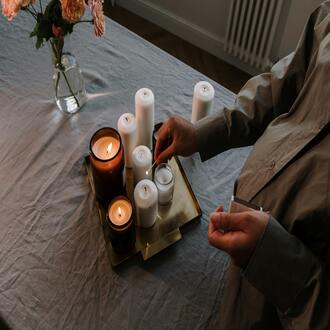Transcription Self-discovery
Self-discovery is the process we go through when trying to define ourselves and learn more about our traits, aptitudes and value systems and principles. Carrying out this process is extremely important for our personal development, since having a clear personality and avoiding an identity crisis will make you stand out socially for your authenticity and the way in which you are able to defend your image before third parties.
Self-discovery is a complex and intimate task, it requires the practice of sincere and coherent self-criticism, where we value both our most positive and negative aspects. Undertaking self-discovery is like trying to meet someone for the first time, the fact that this someone is ourselves means that this whole journey is biased by emotions and feelings that you must avoid if you want the result to be real and honest.
During the development of this guide we will be addressing some of the most important elements on this topic, so that you can put self-discovery into practice for your personal development.
Avoid preconceived ideas about yourself
At the beginning of self-discovery we will seek to carry out a deep analysis of who we are and what are those characteristics that define us as a social being. This includes aptitudes, innate abilities, values, principles, among others. It is normal to arrive at this point loaded with a series of preconceived ideas about our person. These ideas have been generated from our exchange with others and the development we have on our self-perception.
Phrases such as: You are a selfish person; You are a great friend; You are bad; You are smart; begin to fill a whole group of prejudices that you will have to face if you want to discover who you really are. Work on your self-discovery by avoiding thinking about what others have led you to believe you are, your goal is to discover yourself and to do that you must judge yourself the way you would judge a stranger.
When you exchange with someone for the first time, you do not know what other people believe about him, so you form a personal criterion without third party biases. In the same way you should do with yourself, think that you have just met someone and that your interest is to discover them in depth.
Do not justify your negative aspects
Self-criticism is a difficult capacity to develop in an honest way, this is because when we criticize ourselves there is a certain resistance that seeks to prevent us from feeling bad about the image we may discover. Self-discovery is not only about highlighting the aspects that we like, but also about knowing how to fully appreciate ourselves, and that includes all those elements that we wish did not exist.
Your negative aspects are part of who you are and the only coherent way to combat them is to start by identifying them.
Use self-criticism to make honest recommendations to yourself.
Self-criticism used well will allow you to correct all those behaviors and characteristics that you wish didn't exist. When you practice self-criticism, the process of self-discovery will not only be limited to the mere identification of traits and characteristics, but will be complemented by an honest recommendation on your part and a commitment to correct the negative patterns you have identified.
If there is something in you that you wish to eliminate, try to counsel yourself as if you were counseling someone else. Think of yourself as talking to your best friend and want to help him change and become a better version of himself. Self-criticism is not to scold, but to guide and support change.
self discovery




